
job-llm
Simplify and improve the job hunting experience by integrating LLMs to automate tasks such as resume and cover letter generation, as well as application submission, saving users time and effort.
Stars: 70
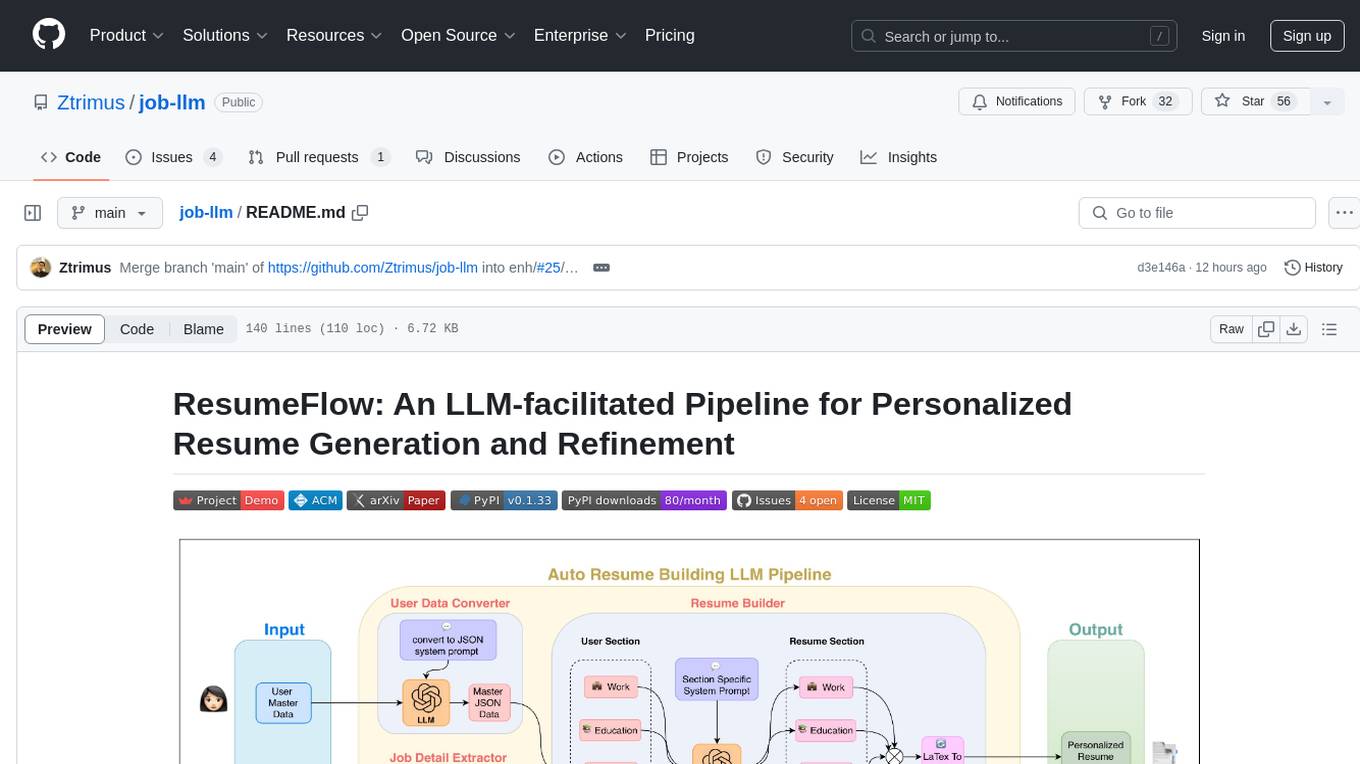
ResumeFlow is an automated system utilizing Large Language Models (LLMs) to streamline the job application process. It aims to reduce human effort in various steps of job hunting by integrating LLM technology. Users can access ResumeFlow as a web tool, install it as a Python package, or download the source code. The project focuses on leveraging LLMs to automate tasks such as resume generation and refinement, making job applications smoother and more efficient.
README:

For Video Demonstration visit the YouTube link: https://youtu.be/Agl7ugyu1N4
Project can be:
- Access as a Web Tool from https://job-aligned-resume.streamlit.app/
- Install as a Python Package from https://pypi.org/project/zlm/
- download as Source Code from https://github.com/Ztrimus/job-llm.git
All other known bugs, fixes, feedbacks, and feature requests can be reported on the GitHub issues page.
Empower others, just like they helped you! Contribute to this open source project & make a difference. ✨ Create a branch, improve the code, & raise a pull request!
- Saurabh Zinjad | Ztrimus | [email protected]
- Amey Bhilegaonkar | ameygoes | [email protected]
- Amrita Bhattacharjee | Amritabh | [email protected]
In this project, we will investigate how to effectively use Large Language Models (LLMs) to automate various aspects of this pipeline.
Because, Solving a task using machine learning methods requires a series of steps that often require large amounts of human effort or labor. Furthermore there might be more steps after the training the ML model, such as evaluation, explaining the behavior of the model, interpreting model outputs, etc. Many of these steps are also often human labor intensive.
We're aiming to create a automated system that makes applying for jobs a breeze. Job hunting has many stages, and we see a chance to automate things and use LLM (Language Model) to make it even smoother. We're looking at different ways, both the usual and some new ideas, to integrate LLM into the job application process. The goal is to reduce how much you have to do and let LLM do its thing, making the whole process easier for you.
1.3. Refer to this Paper for more details.
- OS : Linux, Mac
- Python : 3.11.6 and above
- LLM API key: OpenAI OR Gemini Pro
pip install zlm- Usage
from zlm import AutoApplyModel
job_llm = AutoApplyModel(
api_key="PROVIDE_API_KEY",
provider="ENTER PROVIDER <gemini> or <openai>",
downloads_dir="[optional] ENTER FOLDER PATH WHERE FILE GET DOWNLOADED, By default, 'downloads' folder"
)
job_llm.resume_cv_pipeline(
"ENTER_JOB_URL",
"YOUR_MASTER_RESUME_DATA" # .pdf or .json
) # Return and downloads curated resume and cover letter.git clone https://github.com/Ztrimus/job-llm.git
cd job-llm- Create and activate python environment (use
python -m venv .envor conda or etc.) to avoid any package dependency conflict. - Install Poetry package (dependency management and packaging tool)
pip install poetry
- Install all required packages.
- Refer pyproject.toml or poetry.lock for list of packages.
OR
poetry install
- If above command not working, we also provided requirements.txt file. But, we recommend using poetry.
pip install -r resources/requirements.txt
- Refer pyproject.toml or poetry.lock for list of packages.
- We also need to install following packages to conversion of latex to pdf
- For linux
NOTE: try
sudo apt-get install texlive-latex-base texlive-fonts-recommended texlive-fonts-extra
sudo apt-get updateif terminal unable to locate package. - For Mac
brew install basictex sudo tlmgr install enumitem fontawesome
- For linux
- Run following script to get result
>>> python main.py /
--url "JOB_POSTING_URL" /
--master_data="JSON_USER_MASTER_DATA" /
--api_key="YOUR_LLM_PROVIDER_API_KEY" / # put api_key considering provider
--downloads_dir="DOWNLOAD_LOCATION_FOR_RESUME_CV" /
--provider="openai" # openai, geminiIf you find JobLLM useful in your research or applications, please consider giving us a star 🌟 and citing it.
@misc{zinjad2024resumeflow,
title={ResumeFlow: An LLM-facilitated Pipeline for Personalized Resume Generation and Refinement},
author={Saurabh Bhausaheb Zinjad and Amrita Bhattacharjee and Amey Bhilegaonkar and Huan Liu},
year={2024},
eprint={2402.06221},
archivePrefix={arXiv},
primaryClass={cs.CL}
}JobLLM is under the MIT License and is supported for commercial usage.
For Tasks:
Click tags to check more tools for each tasksFor Jobs:
Alternative AI tools for job-llm
Similar Open Source Tools

job-llm
ResumeFlow is an automated system utilizing Large Language Models (LLMs) to streamline the job application process. It aims to reduce human effort in various steps of job hunting by integrating LLM technology. Users can access ResumeFlow as a web tool, install it as a Python package, or download the source code. The project focuses on leveraging LLMs to automate tasks such as resume generation and refinement, making job applications smoother and more efficient.
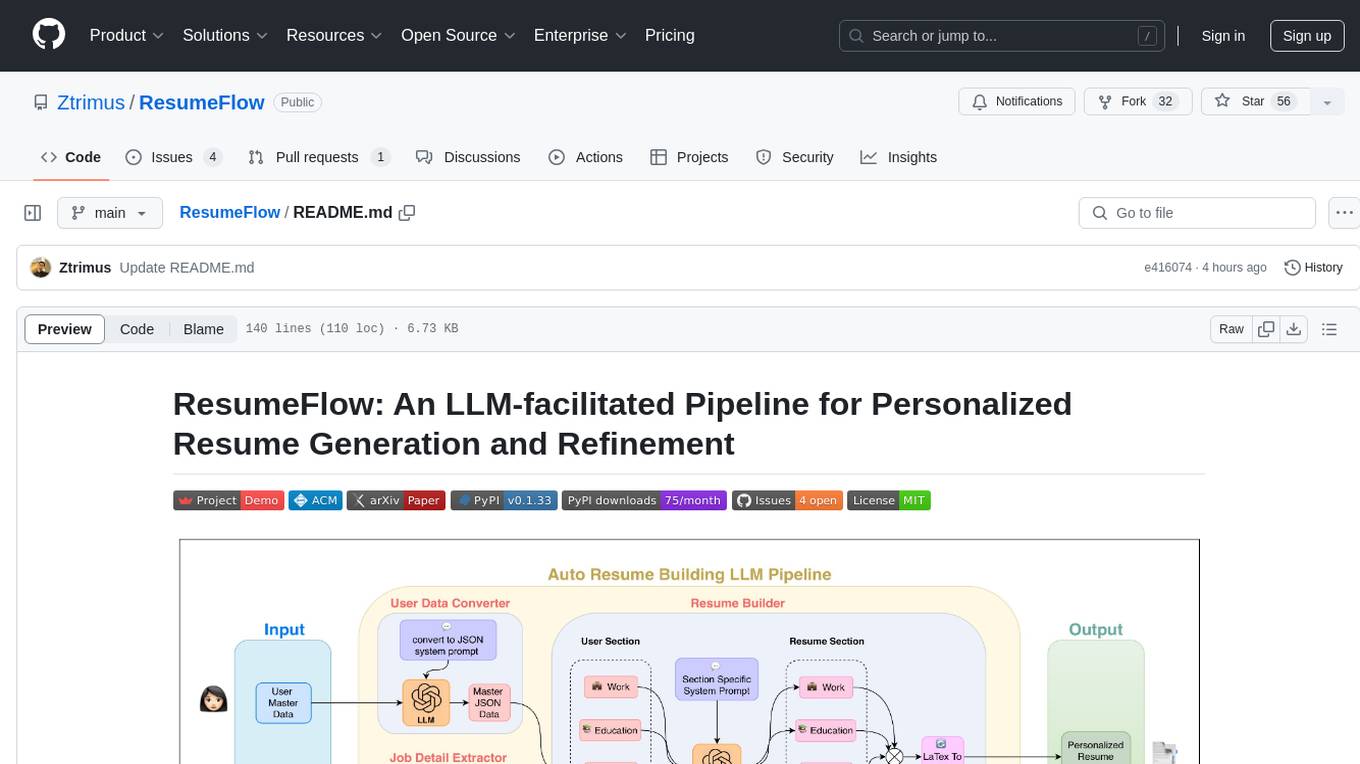
ResumeFlow
ResumeFlow is an automated system that leverages Large Language Models (LLMs) to streamline the job application process. By integrating LLM technology, the tool aims to automate various stages of job hunting, making it easier for users to apply for jobs. Users can access ResumeFlow as a web tool, install it as a Python package, or download the source code from GitHub. The tool requires Python 3.11.6 or above and an LLM API key from OpenAI or Gemini Pro for usage. ResumeFlow offers functionalities such as generating curated resumes and cover letters based on job URLs and user's master resume data.

DemoGPT
DemoGPT is an all-in-one agent library that provides tools, prompts, frameworks, and LLM models for streamlined agent development. It leverages GPT-3.5-turbo to generate LangChain code, creating interactive Streamlit applications. The tool is designed for creating intelligent, interactive, and inclusive solutions in LLM-based application development. It offers model flexibility, iterative development, and a commitment to user engagement. Future enhancements include integrating Gorilla for autonomous API usage and adding a publicly available database for refining the generation process.

MetaGPT
MetaGPT is a multi-agent framework that enables GPT to work in a software company, collaborating to tackle more complex tasks. It assigns different roles to GPTs to form a collaborative entity for complex tasks. MetaGPT takes a one-line requirement as input and outputs user stories, competitive analysis, requirements, data structures, APIs, documents, etc. Internally, MetaGPT includes product managers, architects, project managers, and engineers. It provides the entire process of a software company along with carefully orchestrated SOPs. MetaGPT's core philosophy is "Code = SOP(Team)", materializing SOP and applying it to teams composed of LLMs.

labelbox-python
Labelbox is a data-centric AI platform for enterprises to develop, optimize, and use AI to solve problems and power new products and services. Enterprises use Labelbox to curate data, generate high-quality human feedback data for computer vision and LLMs, evaluate model performance, and automate tasks by combining AI and human-centric workflows. The academic & research community uses Labelbox for cutting-edge AI research.
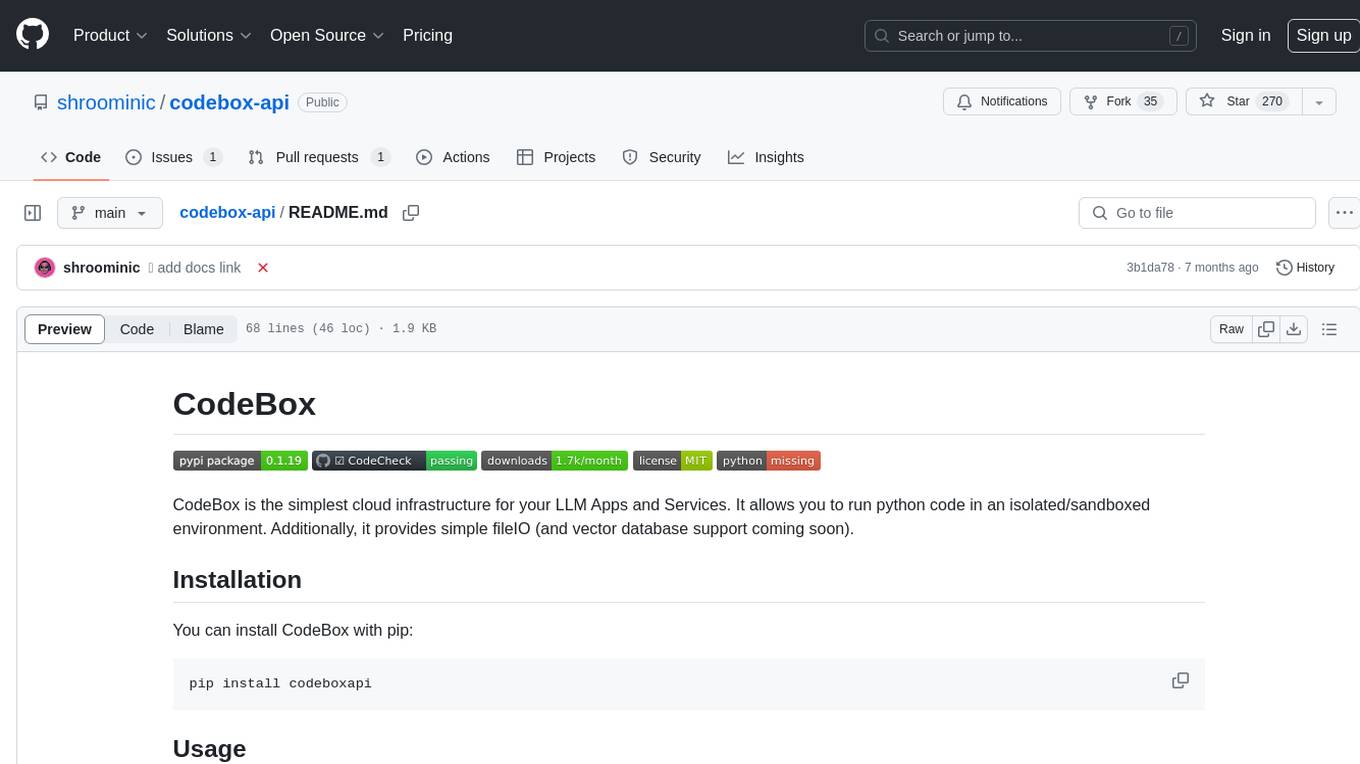
codebox-api
CodeBox is a cloud infrastructure tool designed for running Python code in an isolated environment. It also offers simple file input/output capabilities and will soon support vector database operations. Users can install CodeBox using pip and utilize it by setting up an API key. The tool allows users to execute Python code snippets and interact with the isolated environment. CodeBox is currently in early development stages and requires manual handling for certain operations like refunds and cancellations. The tool is open for contributions through issue reporting and pull requests. It is licensed under MIT and can be contacted via email at [email protected].

BentoML
BentoML is an open-source model serving library for building performant and scalable AI applications with Python. It comes with everything you need for serving optimization, model packaging, and production deployment.
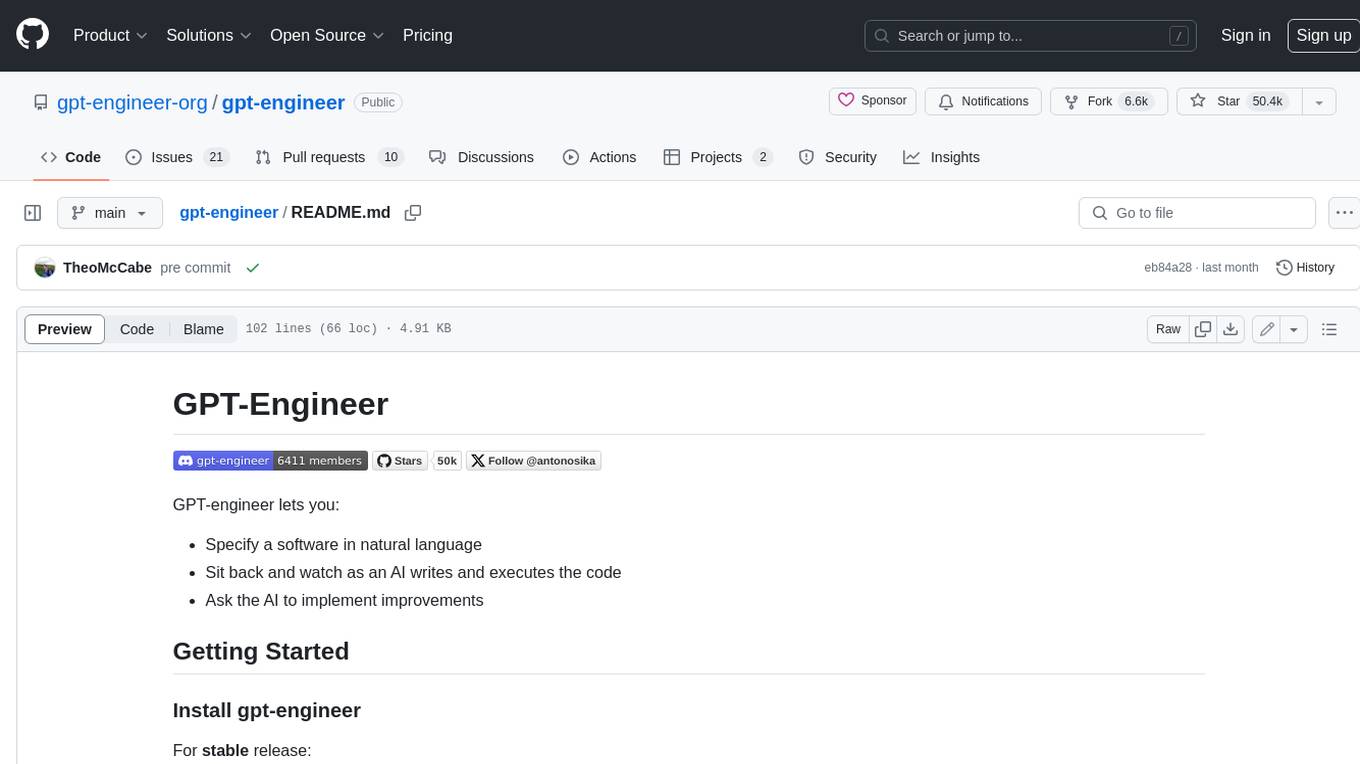
gpt-engineer
GPT-Engineer is a tool that allows you to specify a software in natural language, sit back and watch as an AI writes and executes the code, and ask the AI to implement improvements.
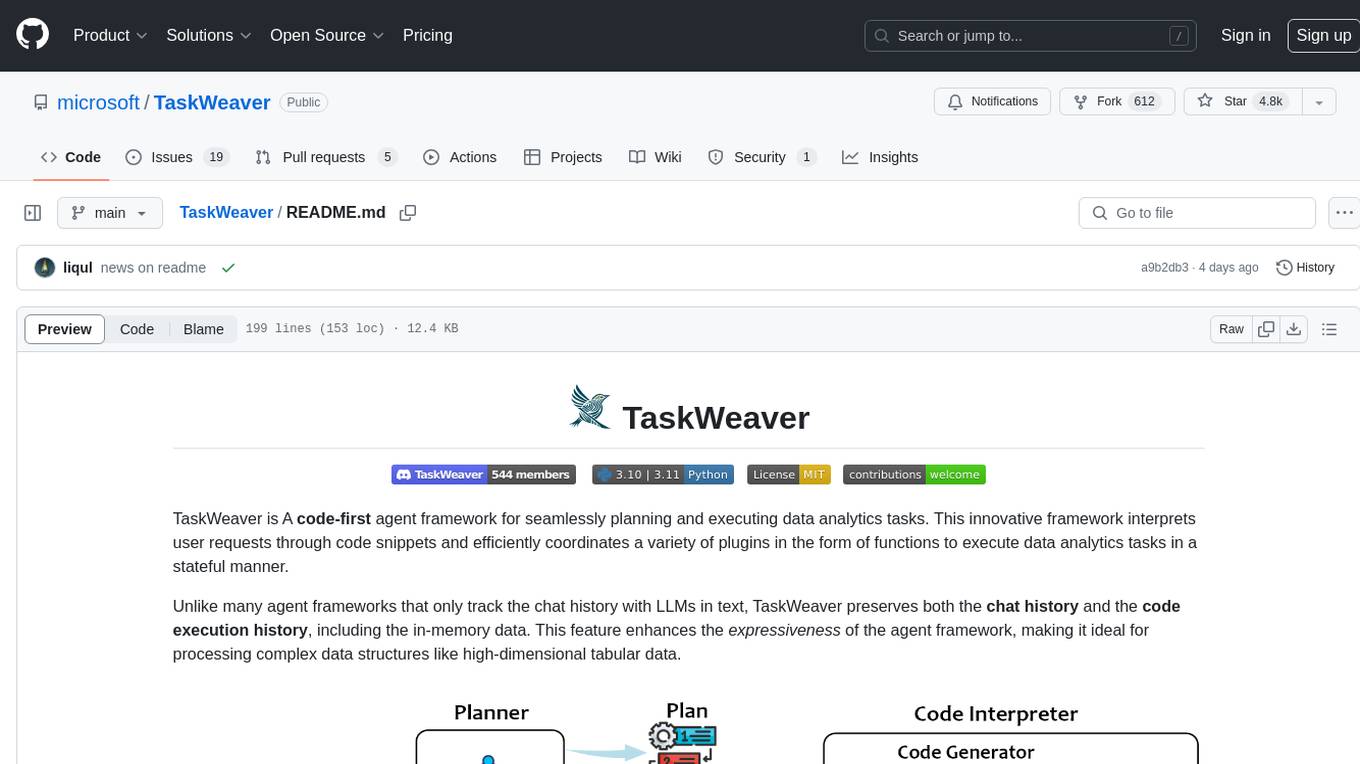
TaskWeaver
TaskWeaver is a code-first agent framework designed for planning and executing data analytics tasks. It interprets user requests through code snippets, coordinates various plugins to execute tasks in a stateful manner, and preserves both chat history and code execution history. It supports rich data structures, customized algorithms, domain-specific knowledge incorporation, stateful execution, code verification, easy debugging, security considerations, and easy extension. TaskWeaver is easy to use with CLI and WebUI support, and it can be integrated as a library. It offers detailed documentation, demo examples, and citation guidelines.
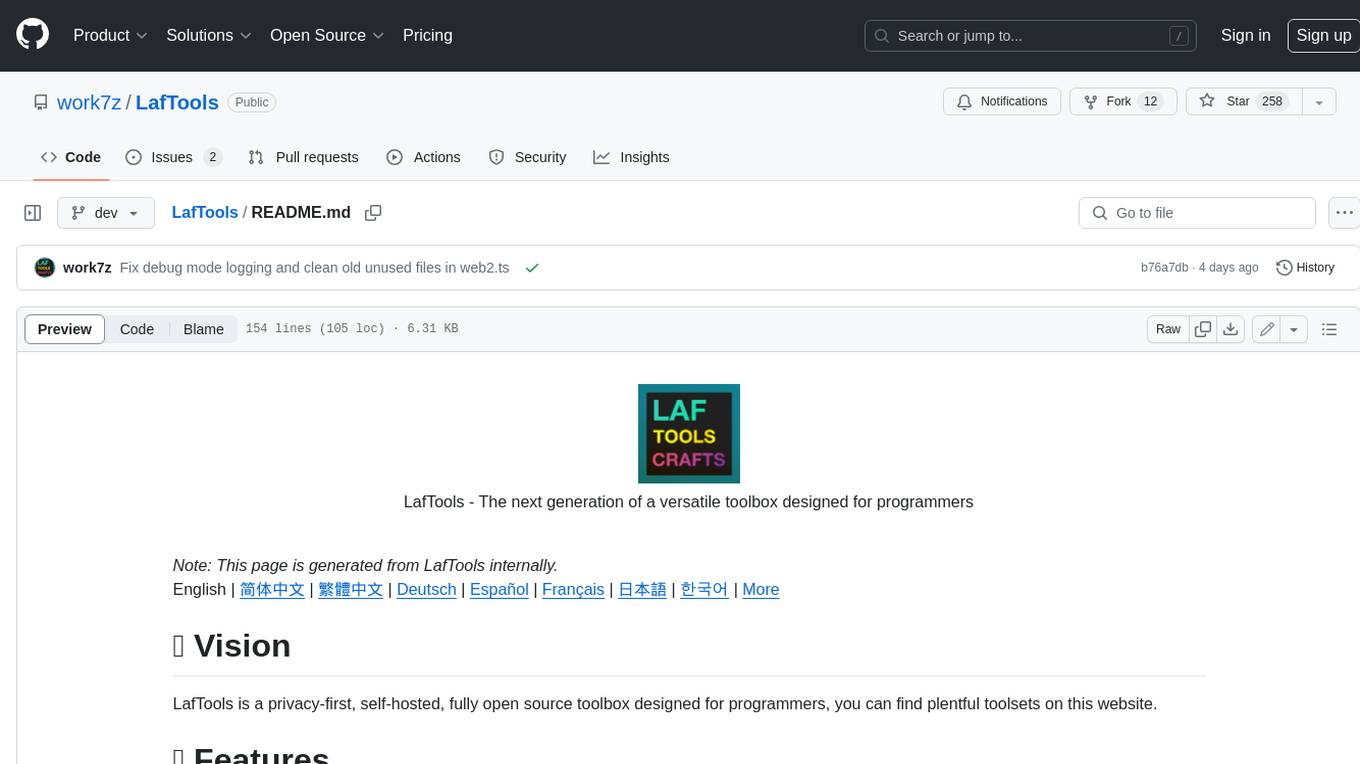
LafTools
LafTools is a privacy-first, self-hosted, fully open source toolbox designed for programmers. It offers a wide range of tools, including code generation, translation, encryption, compression, data analysis, and more. LafTools is highly integrated with a productive UI and supports full GPT-alike functionality. It is available as Docker images and portable edition, with desktop edition support planned for the future.
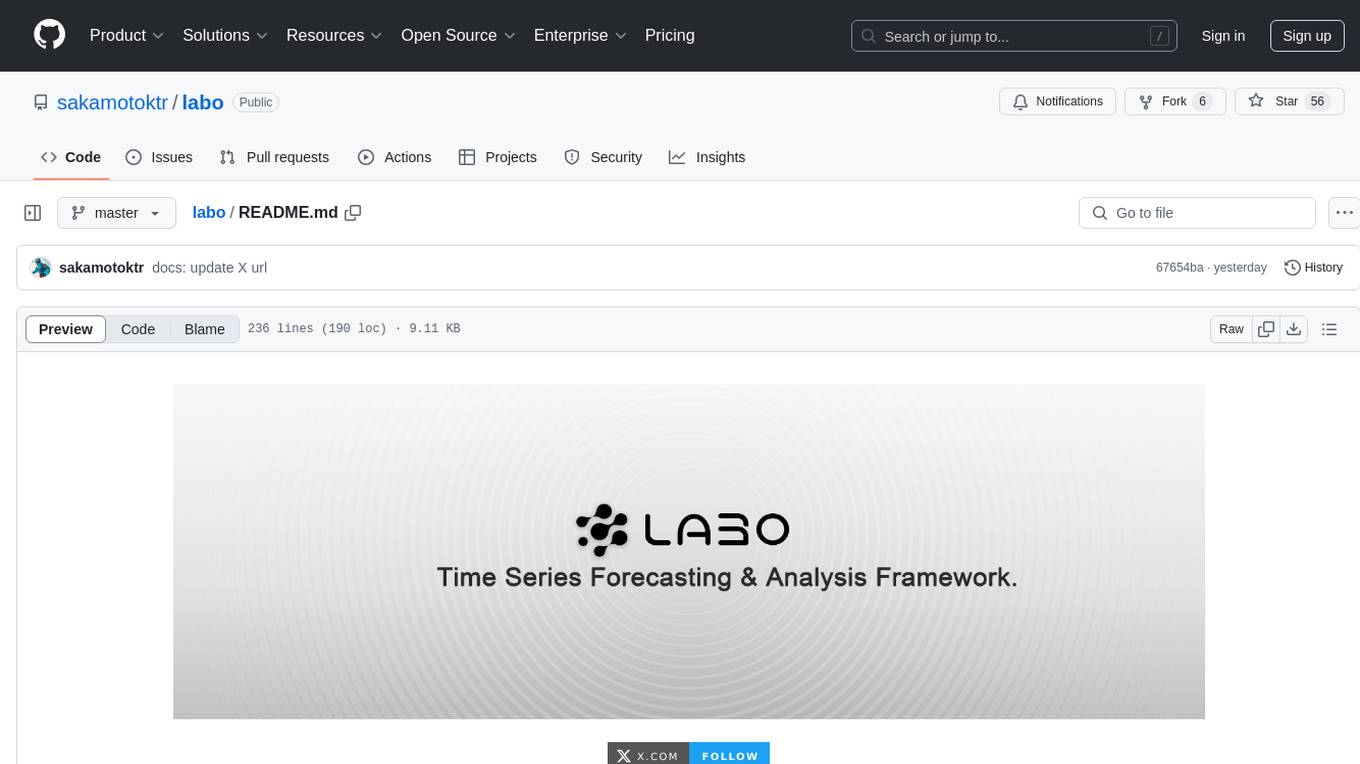
labo
LABO is a time series forecasting and analysis framework that integrates pre-trained and fine-tuned LLMs with multi-domain agent-based systems. It allows users to create and tune agents easily for various scenarios, such as stock market trend prediction and web public opinion analysis. LABO requires a specific runtime environment setup, including system requirements, Python environment, dependency installations, and configurations. Users can fine-tune their own models using LABO's Low-Rank Adaptation (LoRA) for computational efficiency and continuous model updates. Additionally, LABO provides a Python library for building model training pipelines and customizing agents for specific tasks.

opencode
Opencode is an AI coding agent designed for the terminal. It is a tool that allows users to interact with AI models for coding tasks in a terminal-based environment. Opencode is open source, provider-agnostic, and focuses on a terminal user interface (TUI) for coding. It offers features such as client/server architecture, support for various AI models, and a strong emphasis on community contributions and feedback.
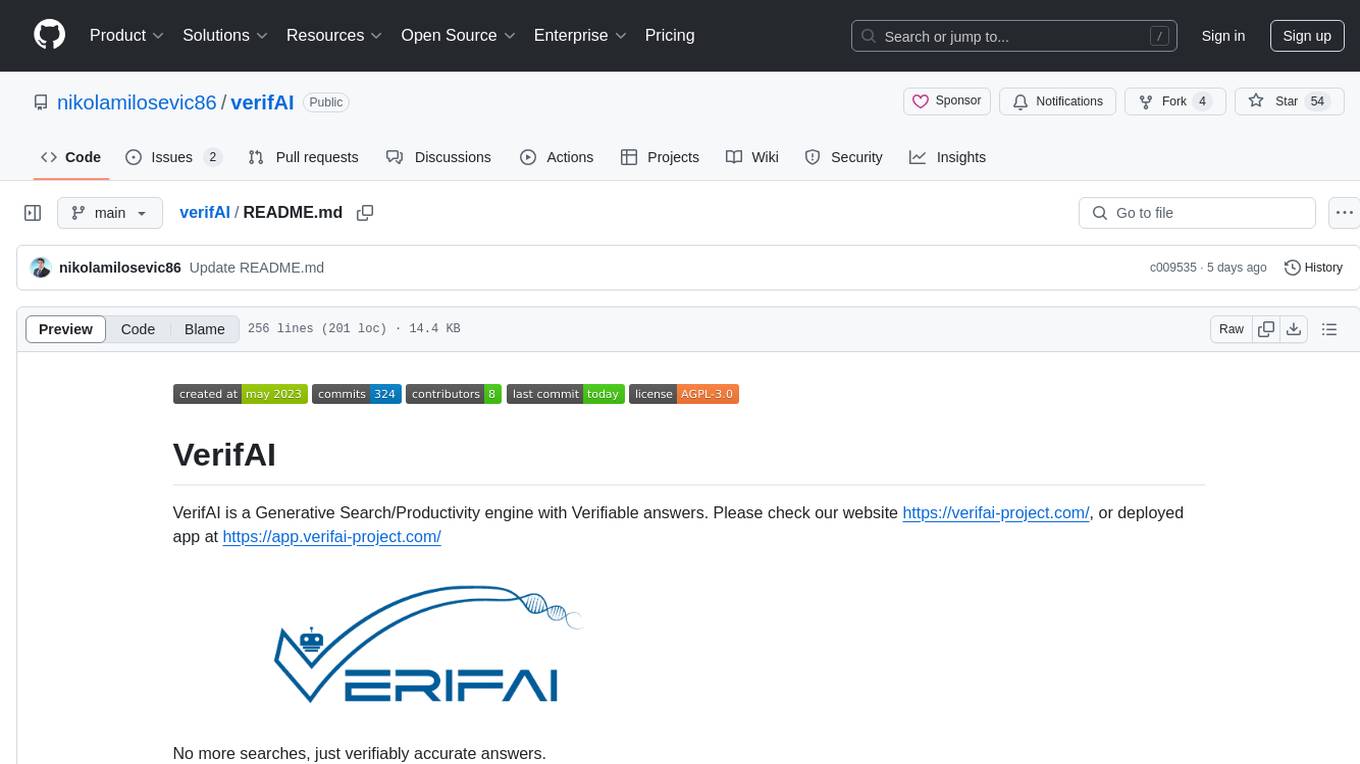
verifAI
VerifAI is a document-based question-answering system that addresses hallucinations in generative large language models and search engines. It retrieves relevant documents, generates answers with references, and verifies answers for accuracy. The engine uses generative search technology and a verification model to ensure no misinformation. VerifAI supports various document formats and offers user registration with a React.js interface. It is open-source and designed to be user-friendly, making it accessible for anyone to use.

uAgents
uAgents is a Python library developed by Fetch.ai that allows for the creation of autonomous AI agents. These agents can perform various tasks on a schedule or take action on various events. uAgents are easy to create and manage, and they are connected to a fast-growing network of other uAgents. They are also secure, with cryptographically secured messages and wallets.

OpenAdapt
OpenAdapt is an open-source software adapter between Large Multimodal Models (LMMs) and traditional desktop and web Graphical User Interfaces (GUIs). It aims to automate repetitive GUI workflows by leveraging the power of LMMs. OpenAdapt records user input and screenshots, converts them into tokenized format, and generates synthetic input via transformer model completions. It also analyzes recordings to generate task trees and replay synthetic input to complete tasks. OpenAdapt is model agnostic and generates prompts automatically by learning from human demonstration, ensuring that agents are grounded in existing processes and mitigating hallucinations. It works with all types of desktop GUIs, including virtualized and web, and is open source under the MIT license.

Biomni
Biomni is a general-purpose biomedical AI agent designed to autonomously execute a wide range of research tasks across diverse biomedical subfields. By integrating cutting-edge large language model (LLM) reasoning with retrieval-augmented planning and code-based execution, Biomni helps scientists dramatically enhance research productivity and generate testable hypotheses.
For similar tasks

job-llm
ResumeFlow is an automated system utilizing Large Language Models (LLMs) to streamline the job application process. It aims to reduce human effort in various steps of job hunting by integrating LLM technology. Users can access ResumeFlow as a web tool, install it as a Python package, or download the source code. The project focuses on leveraging LLMs to automate tasks such as resume generation and refinement, making job applications smoother and more efficient.
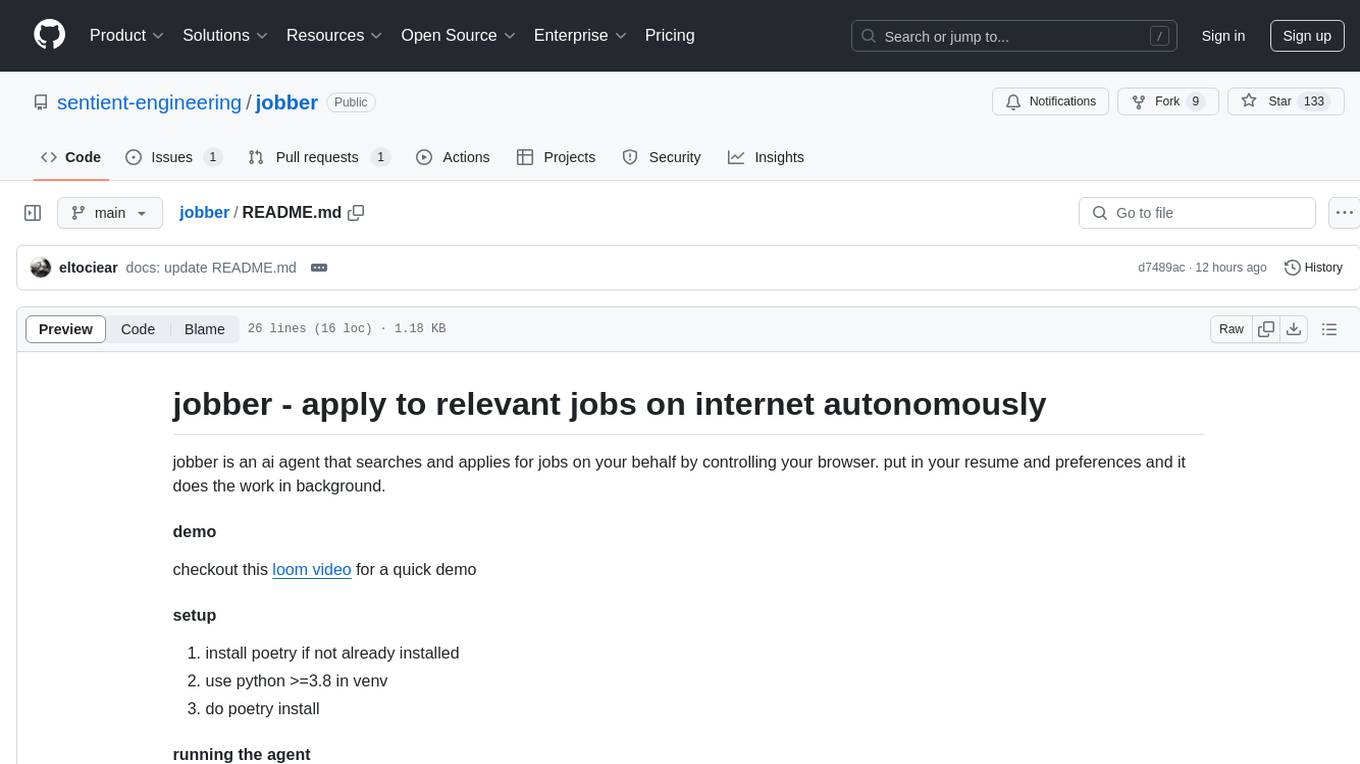
jobber
Jobber is an AI agent that autonomously searches and applies for jobs on the internet on behalf of the user. By controlling the browser, users can input their resume and preferences, allowing Jobber to work in the background. The tool streamlines the job application process by automating the repetitive task of job hunting and applying, saving users time and effort. Jobber offers a convenient solution for individuals looking to explore job opportunities without the hassle of manual job searching and application submission.

resume-design
Resume-design is an open-source and free resume design and template download website, built with Vue3 + TypeScript + Vite + Element-plus + pinia. It provides two design tools for creating beautiful resumes and a complete backend management system. The project has released two frontend versions and will integrate with a backend system in the future. Users can learn frontend by downloading the released versions or learn design tools by pulling the latest frontend code.

magic-resume
Magic Resume is a modern online resume editor that makes creating professional resumes simple and fun. Built on Next.js and Framer Motion, it supports real-time preview and custom themes. Features include Next.js 14+ based construction, smooth animation effects (Framer Motion), custom theme support, responsive design, dark mode, export to PDF, real-time preview, auto-save, and local storage. The technology stack includes Next.js 14+, TypeScript, Framer Motion, Tailwind CSS, Shadcn/ui, and Lucide Icons.
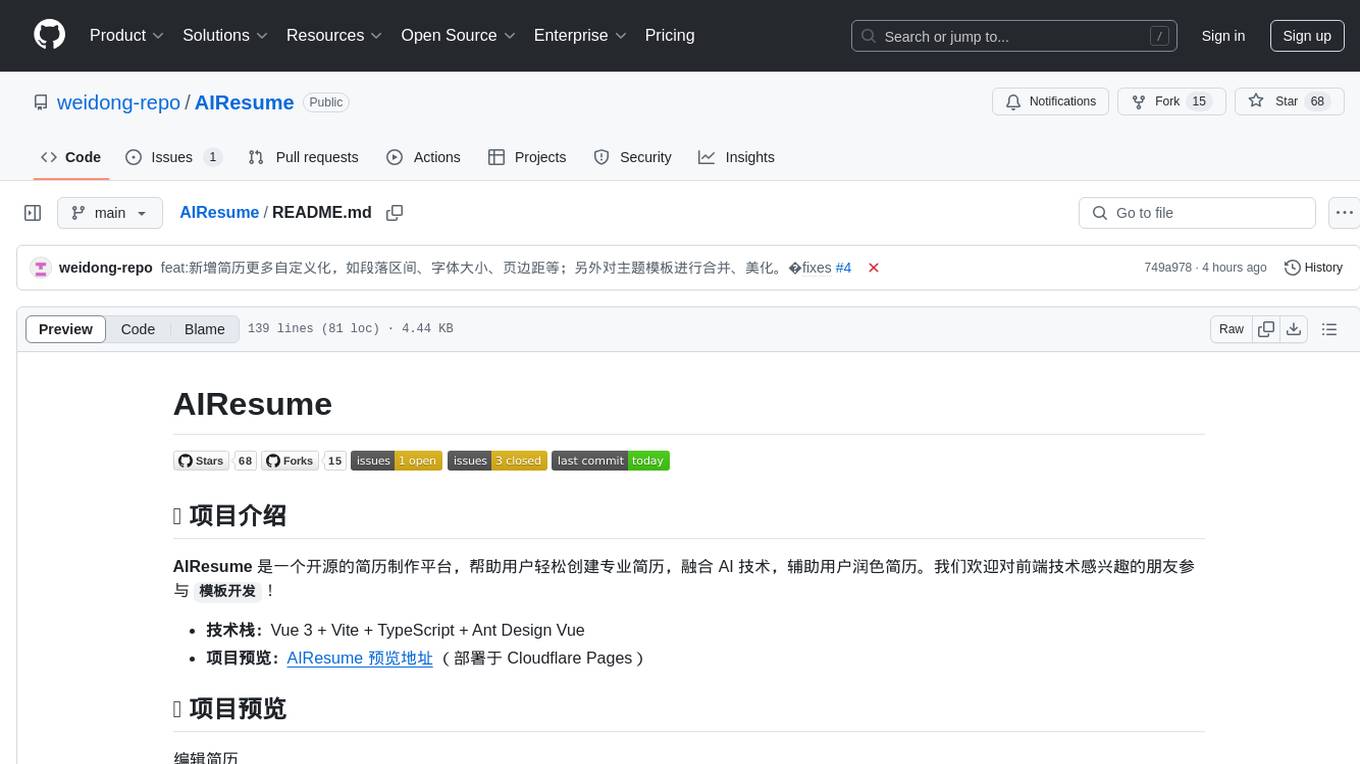
AIResume
AIResume is an open-source resume creation platform that helps users easily create professional resumes, integrating AI technology to assist users in polishing their resumes. The project allows for template development using Vue 3, Vite, TypeScript, and Ant Design Vue. Users can edit resumes, export them as PDFs, switch between multiple resume templates, and collaborate on template development. AI features include resume refinement, deep optimization based on individual projects or experiences, and simulated interviews for user practice. Additional functionalities include theme color switching, high customization options, dark/light mode switching, real-time preview, drag-and-drop resume scaling, data export/import, data clearing, sample data prefilling, template market showcasing, and more.

ResumeFlow
ResumeFlow is an automated system that leverages Large Language Models (LLMs) to streamline the job application process. By integrating LLM technology, the tool aims to automate various stages of job hunting, making it easier for users to apply for jobs. Users can access ResumeFlow as a web tool, install it as a Python package, or download the source code from GitHub. The tool requires Python 3.11.6 or above and an LLM API key from OpenAI or Gemini Pro for usage. ResumeFlow offers functionalities such as generating curated resumes and cover letters based on job URLs and user's master resume data.
For similar jobs

ChatFAQ
ChatFAQ is an open-source comprehensive platform for creating a wide variety of chatbots: generic ones, business-trained, or even capable of redirecting requests to human operators. It includes a specialized NLP/NLG engine based on a RAG architecture and customized chat widgets, ensuring a tailored experience for users and avoiding vendor lock-in.

anything-llm
AnythingLLM is a full-stack application that enables you to turn any document, resource, or piece of content into context that any LLM can use as references during chatting. This application allows you to pick and choose which LLM or Vector Database you want to use as well as supporting multi-user management and permissions.

ai-guide
This guide is dedicated to Large Language Models (LLMs) that you can run on your home computer. It assumes your PC is a lower-end, non-gaming setup.

classifai
Supercharge WordPress Content Workflows and Engagement with Artificial Intelligence. Tap into leading cloud-based services like OpenAI, Microsoft Azure AI, Google Gemini and IBM Watson to augment your WordPress-powered websites. Publish content faster while improving SEO performance and increasing audience engagement. ClassifAI integrates Artificial Intelligence and Machine Learning technologies to lighten your workload and eliminate tedious tasks, giving you more time to create original content that matters.

mikupad
mikupad is a lightweight and efficient language model front-end powered by ReactJS, all packed into a single HTML file. Inspired by the likes of NovelAI, it provides a simple yet powerful interface for generating text with the help of various backends.

glide
Glide is a cloud-native LLM gateway that provides a unified REST API for accessing various large language models (LLMs) from different providers. It handles LLMOps tasks such as model failover, caching, key management, and more, making it easy to integrate LLMs into applications. Glide supports popular LLM providers like OpenAI, Anthropic, Azure OpenAI, AWS Bedrock (Titan), Cohere, Google Gemini, OctoML, and Ollama. It offers high availability, performance, and observability, and provides SDKs for Python and NodeJS to simplify integration.

onnxruntime-genai
ONNX Runtime Generative AI is a library that provides the generative AI loop for ONNX models, including inference with ONNX Runtime, logits processing, search and sampling, and KV cache management. Users can call a high level `generate()` method, or run each iteration of the model in a loop. It supports greedy/beam search and TopP, TopK sampling to generate token sequences, has built in logits processing like repetition penalties, and allows for easy custom scoring.

firecrawl
Firecrawl is an API service that takes a URL, crawls it, and converts it into clean markdown. It crawls all accessible subpages and provides clean markdown for each, without requiring a sitemap. The API is easy to use and can be self-hosted. It also integrates with Langchain and Llama Index. The Python SDK makes it easy to crawl and scrape websites in Python code.






